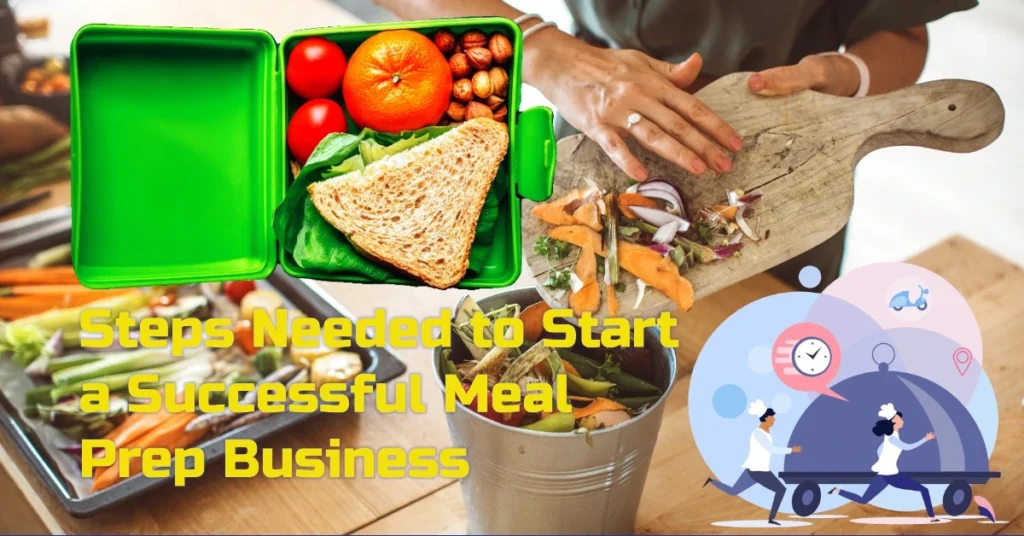
Starting a meal prep business allows you to tap into the growing demand for convenient, healthy, home-cooked meals. With busy modern lifestyles, meal prepping has surged in popularity. Launching a meal prep company in 2023 is a timely opportunity to run your business while providing a valued service. This post will serve as your roadmap to start your meal prep business through the essential steps of a successful meal prep delivery venture.
What is Meal Prepping and Why is it Popular?
Meal prepping involves preparing complete meals ahead of time to portion out and eat throughout the week. This saves time and lets people eat healthy instead of ordering takeout. Meal prepping’s popularity has risen with busier schedules and greater nutrition awareness. It provides convenience for hectic lifestyles. People also use meal prepping to save money by buying ingredients in bulk. Interest continues growing as life gets faster-paced.

What are the Benefits of Starting a Meal Prep Business?
Starting a meal prep business in 2023 is a venture ripe with potential. Here’s why:
- Financial Flexibility: With a meal prep delivery business, you set the price per meal, controlling your profit margins.
- Work-Life Harmony: Run your business from your home kitchen, blending personal and professional life seamlessly.
- Market Demand: Capitalize on the surge in demand for prepared meals, securing your share in a booming industry.
- Creative Freedom: Design meal kits that reflect your culinary creativity and passion.
- Community Impact: Make a positive contribution to your community by providing healthy, accessible food options.
Target Market for Meal Prep
The target market includes busy professionals, working parents, students, fitness enthusiasts, bodybuilders, and families seeking nutritious meal options. It’s a market that values the convenience of meal deliveries alongside the desire for delicious meals that cater to various dietary preferences.
For students and urban dwellers, delivery is appealing without full kitchens. Gymgoers need high-protein, low-carb, diet-specific meals to meet fitness goals. Busy moms and dads often lack time to cook nutritious family meals. With little free time, these groups want convenient, healthy, homemade meals without cooking.
It’s a market that values the convenience of meal deliveries alongside the desire for delicious meals that cater to various dietary preferences. Understanding this audience’s needs is crucial, whether they are looking for low-carb options or complete family meal kits.
By tailoring your business model to meet these needs, you can ensure your meal prep delivery service resonates with and retains a loyal customer base. Essentially, health-conscious consumers wanting home cooking without the prep make up the target demographic. Cater to their busy lifestyles and dietary needs.
Steps Needed to Start a Successful Meal Prep Business

Research Your Market and Competition
Before starting your own meal prep business, thoroughly research who your competitors are in the local area.
- Check what meal prep companies already exist, and analyze their offerings and business models.
- Look for information on their menu options, pricing, and any niche diets they cater to.
- You can order some competitor meals to taste test.
- Identify the strengths and weaknesses you observe in competing businesses.
For example, take note if you see room to improve on health, flavor, or convenience. If other companies are struggling with poor reviews or customer service, those represent opportunities for you to do better.
Also, evaluate the needs of your specific local market by surveying potential customers directly. Ask them what they would want or expect from a meal prep delivery service. Researching the competition and your local market will inform what you offer and how you brand and market your business.
Choose a Business Structure
When starting a meal prep business, you’ll need to choose a formal business structure. Basic options include:
- Sole proprietorship: Sole proprietorship is simplest with less paperwork, but you are personally liable.
- Partnership: Partnerships allow you to share ownership and split responsibilities. Weigh the options based on your goals, needs, and state regulations.
- Limited Liability Company (LLC), and Corporation: With an LLC or corporation, you are protected from personal liability but have more legal obligations.
Most small meal prep businesses operate as sole proprietorships or LLCs. Consult legal and tax professionals to determine the ideal business structure.
Develop Your Business Plan
A detailed small business plan is critical for guiding your meal prep industry and attaining funding. Your plan should include:
- Mission and Vision: What are the long-term aims for your business? For example, your vision could be “To provide quick, healthy, affordable meal options to busy families in Seattle.”
- Products/Menu: What specific type of meals, diets, and offerings will you provide? Consider having set menu options along with weekly specials and custom orders. Offerings should be nutritious, tasty, and simple to prepare cost-effectively.
- Pricing: Determine reasonable pricing for your market based on food costs and time invested. Balance affordability for customers with profitability. You may offer discounts for larger orders or subscriptions.
- Marketing: How will you promote your business? Marketing tactics could include social media ads, website SEO, partnerships with gyms or offices, coupons, and pamphlet distribution.
- Sales: Will you offer delivery, pickup, or both? Create an online ordering platform for seamless sales.
- Financial Projections: Estimate costs for equipment, ingredients, labor, packaging, and promotions. Project realistic sales volumes. Calculate profits based on pricing. Develop monthly and yearly profit/loss forecasts.
Having a well-defined meal prep business plan is crucial for securing funding and launching your company strategically.
Handle Licensing and Legalities
A business owner before starting a business legally requires obtaining the proper permits, licenses, and insurance. While requirements vary by state and city, some essential items include:
- Most areas require a general business license to operate. Apply through your local county or municipal office.
- A food permit ensures your commercial kitchen is up to code. Get inspected by the health department.
- Complete a certified food safety training course. Proper handling is crucial.
- Liability insurance protects if a customer gets sick. Work with an agent to find an affordable business insurance policy.
- If preparing food in your home kitchen, research cottage food laws in your state. Some allow limited home production.
- Consult lawyers and accountants to understand legal and tax obligations.
- Register your business name and branding consistently across states.
- Understand and comply with your state and city’s specific health care codes for commercial meal production.
Handling licensing and regulations properly from the start reduces risks down the road. While tedious, legal due diligence protects your investment in this rewarding new business venture.
Find a Commercial Kitchen
Operating a legal meal prep business requires a licensed commercial kitchen. When selecting your kitchen, consider key factors like location, size, amenities, and health code compliance.
You will need adequate space for safe food handling based on your production volumes. High-capacity equipment is also essential for efficient batch cooking. Easy access to deliveries and transport is crucial. Proximity to your service area minimizes drive times. Kitchen rental rates range widely from $15-$40 per hour typically. Weigh costs against functionality.
Thoroughly vet options to ensure the kitchen is licensed and meets all health codes. Confirm proper ventilation, sanitation systems, refrigeration, storage, and more. Ask for documentation of recent inspections. Trying to cut corners with an unlicensed kitchen creates massive legal and safety risks.
Finding the ideal certified commercial kitchen provides the compliant, sizable, and well-equipped foundation for your meal prep business. Don’t rush this critical decision in your startup process. Consulting local restaurant groups can provide insights on facilities that best enable successful meal prep delivery operations and outcomes.
Commercial Kitchen Requirements
| Requirement | Details |
|---|---|
| Health Code Compliance | Must meet local health department standards |
| Equipment | Industrial-grade appliances and ample prep areas |
| Storage | Sufficient refrigeration and dry storage space |
| Cost | Rental fees and utility costs |
| Accessibility | For deliveries and pickups |
| Size | To handle current and future production needs |
| Lease Terms | Flexibility and scalability |
Purchase Equipment and Supplies
Outfitting your commercial kitchen with the right equipment and supplies is essential when starting a meal prep business. You’ll need:
- High-capacity appliances like commercial ovens, stoves, refrigerators, and dishwashers to produce large batches efficiently.
- Smallwares like pots, pans, utensils, knives, cutting boards, food processors, and blenders suited for heavy use. Allocate around $3,000 for small wares.
- Packaging supplies like BPA-free meal prep containers, lids, bags, and labels. Buy in bulk from restaurant supply retailers. Plan to spend $2,000+ on packaging materials.
- Racks, shelving, and storage bins to organize ingredients and finished meals. Expect to spend $1,000+ outfitting your storage.
- Sanitation tools like disinfecting spray, paper towels, hair nets, and disposable gloves to uphold safety. Budget $500+ for cleaning supplies.
- Durable prep tables and carts for efficient workflow. Allow $1,000+ for durable furniture.
Take time to find commercial-grade equipment and supplies built to endure high-volume production. Avoid flimsy consumer-grade items unlikely to withstand daily commercial use. Purchase intelligently to maximize value within startup budget constraints. Proper equipment provides the engine for smoothly operating your meal prep delivery service.
Estimated Costs for Essential Equipment
| Equipment/Supply | Estimated Cost |
|---|---|
| Commercial Oven | $1,000 – $10,000 |
| Refrigeration Unit | $1,500 – $5,000 |
| Stainless Steel Pots & Pans | $500 – $2,000 |
| Prep Containers (Bulk) | $100 – $500 |
| Packaging & Branding | $250 – $1,000 |
| Label Printer | $100 – $300 |
| Safety & Cleaning Supplies | $200 – $600 |
Design Your Menu
Crafting your menu is crucial for any meal prep business. Focus on nutritious and delicious dishes with proven popularity and reasonable ingredient costs to maximize profit margins.
Emphasize fresh, whole foods like lean proteins, vegetables, healthy grains, and natural flavorings. Avoid highly processed ingredients. Accommodate specialized diets like gluten-free, Paleo, low-carb, and vegan with clearly marked options.
Keep recipes relatively simple to scale up production efficiently. Complex dishes with rare ingredients or tedious prep work don’t make economic sense for meal prep businesses. Offer variety and rotate seasonal specials, but have a consistent slate of bestsellers.
Describe offerings in detail, including nutritional information and allergen warnings. This transparency helps health-conscious customers make informed choices. Allow reasonable customization so patrons feel engaged in the process.
Take time to curate a menu that aligns with your brand, ideal profit margins, and target demographic preferences. Solicit customer feedback to refine offerings. A strategic menu provides the backbone of your meal prep delivery service by balancing business success and client satisfaction.
Source Ingredients and Supplies
Strategic sourcing ensures you have high-quality ingredients and cost-effective supplies to operate your meal prep business.
- Sourcing is crucial for creating consistent, high-quality meals cost-effectively.
- Find reliable local suppliers for fresh produce, lean proteins, and other ingredients basic to your menu.
- Building relationships with farms, butchers, and markets can help secure discounts on bulk orders.
- Shop around wholesale clubs or restaurant supply stores for grains, spices, canned goods, and other non-perishables.
- Only work with reputable suppliers who offer affordable pricing, good service, and delivery flexibility.
For meal containers and other supplies, research options online to find deals, buying in bulk almost always saves money. Strategic relationships with vendors who understand the needs of meal prep providers are invaluable. Take time to source each ingredient and supply intelligently based on quality, cost, and reliability. This provides the foundation for executing your weekly meal prep delivery smoothly.
Market and Sell Your Meals
A multifaceted marketing and sales strategy will be critical for attracting customers, including:
- Develop an eye-catching brand and professional meal prep website to establish credibility.
- Hire a photographer to showcase your delicious, beautifully plated meals.
- Use social media channels like Facebook and Instagram to interact with potential customers and market your company.
- Strategic search engine optimization and local advertising help drive web traffic.
- Offer free samples or discounts to build local buzz. See if you can partner with nearby gyms, offices, or apartment buildings to sell onsite.
Streamline ordering through an online platform with the help of meal prep software that accepts meal subscriptions and individual purchases, such as:
- Offer the convenience of auto-recurring delivery or easy online pickups.
- Allow people to select meals and customize preferences each week rather than committing upfront.
- Provide excellent customer service when fielding orders and inquiries.
Creating a remarkable whole-to-end experience from marketing to delivery increases customer retention. Continuously track vital metrics such as sales volume, website traffic, and client retention rates to enhance and optimize your strategic efforts.
Provide Excellent Customer Service
Delivering exceptional service ensures satisfied customers and positive word-of-mouth for your meal prep business.
- Make it easy for customers to provide feedback through surveys, online reviews, and social media. Listen carefully and respond promptly.
- Accommodate reasonable customization and substitution requests whenever possible.
- Invest in CRM software to track orders and requests. Personalize service where you can.
- Hire polite, professional staff to handle inquiries and issues. Empower them to make things right.
- Set fair, competitive meal pricing based on your costs and local market rates. Offer bundle deals and subscriptions.
- Stand out with surprise perks like thank-you notes, free items, and coupon codes.
- Set sales goals, but focus on lifetime customer value over one-time transactions.
Providing personalized care shows customers you value their continued business. Meeting and exceeding expectations should drive all your customer service decisions. This commitment to exceptional service boosts satisfaction, loyalty, referrals, and ultimately your bottom line.
Manage Operations and Finances
Running an efficient meal prep business requires strategic management of daily operations and finances.
- Managing ongoing operations and cash flow will take oversight and organization.
- Choose an established recipe software to help plan and cost meals efficiently.
- Keep detailed records of all expenses and sales.
- Produce meals in regular batches for simplicity. Arrange deliveries directly where possible to control costs.
- Hire cooks and delivery drivers if needed, and provide training to maintain quality standards.
- Set budgets for ingredients, supplies, equipment, marketing, payroll, rent, insurance, and other costs.
Funding options include:
- Personal savings and loans from friends/family
- Small business loans and investors
- Crowdfunding campaigns
- Keep meticulous financial records. Continuously monitor cash flow and adjust budgets as needed.
- Build an emergency fund equal to 2-3 months of operating expenses as a cushion.
Managing finances prudently while running efficient daily operations is challenging but critical. Starting and running a meal prep business takes diligent organization, patience, adaptability, and a commitment to improvement. With hard work and smart management, your company can flourish.
Grow Your Business
Once your meal prep business is established, you can focus on controlled growth. Possible expansion strategies include:
- Increasing your service area to neighboring towns and cities to acquire new customers.
- Expanding your facility or staff to support higher order volumes.
- Adding new menu offerings like smoothies, snacks, or dietary packages.
- Offering meal plan subscriptions and loyalty programs to increase recurring revenue.
- Partnering with gyms, offices, or shops to sell onsite.
- Advertising through local events, radio, magazines, or billboards.
- Optimizing your online presence with SEO, social media, and promotions.
- Developing a mobile app for more convenient ordering.
- Franchising your brand once operations are proven.
Preserving your funds and resources while adjusting smartly in response to demand are the two most important aspects. Conservative growth allows you to maintain quality control and stellar service even as you expand your market reach and offerings. Patience and persistence will enable your small business to flourish.

Wrapping Up
Embarking on an entrepreneurial journey to start a meal prep business requires courage, effort, and passion. Through dedication and perseverance, this rewarding path can lead to a thriving company. This guide has outlined essential steps – from obtaining licenses to delighting customers.
While challenges arise when starting any business from scratch, hundreds of entrepreneurs have overcome them through hard work and preparation. Now is the time to take action on your vision. Conduct extensive market research, draft a detailed business plan, and invest in the right equipment and commercial kitchen space to lay the foundation.
Stay focused on bringing healthy and delicious meals to your community. With strategic thinking and relentless customer care, you can grow a successful and meaningful business. Let your passion fuel the drive to achieve your goal of running a top-tier meal prep delivery service. The possibilities are endless when you combine belief in your mission with diligent preparation and effort.

